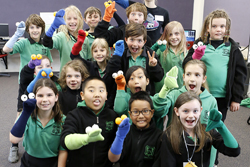
3/4 Team Term Letter – Term 2 2024
Dear families,
Welcome to Term 2! We look forward to continuing working in partnership with you and your child this term. The 3/4 team inquiry focus for this term is linked to the Civics and Citizenship strand of the HASS curriculum.
We have tied our guiding question to our learner assets (in particular ‘I am a positive contributor’) and Turner School’s Annual Action Plan priority of ‘Increasing Learners’ Ability to Demonstrate Obligation to Self and Community’
Our guiding question this term is: Are rules really made to be broken?
Students will explore this question by analysing topics such as:
- How decisions are made democratically
- How personal identity is been shaped by belonging to and positively contributing towards groups
- Why rules are important in our school and the broader community
- The potential consequences of rules not being followed
Home Learning
The Term 2 Home Learning grid will be posted to your child’s Google Classroom at the start of this term and provides opportunities for students to practice, share, consolidate and extend what they have been learning in the classroom. These learning experiences can be completed independently and are not compulsory. If your child chooses to complete the home learning, they can return it to their class teacher fortnightly on a Friday (odd weeks) for feedback.
We are looking forward to a great term of learning!
Kind regards,
The 2024 3/4 Team
Aidan aidan.tandy@ed.act.edu.au
Chelsea chelsea.mckenzie@ed.act.edu.au
Craig craig.white@ed.act.edu.au
Emily emily.gregory@ed.act.edu.au
Evan evan.gilson@ed.act.edu.au
Kailee kailee.bingley@ed.act.edu.au
Micha micha.scott@ed.act.edu.au
Rima (Indonesian) rima.kemp@ed.act.edu.au
Laura (Visual Arts) laura.langston@ed.act.edu.au
Kimberley (Music) kimberley.steele@ed.act.edu.au
Term 2 Learning Overview for Year 3/4
Please find below the Term 2 Overview (including Achievement Standards from the new Australian Curriculum version 9.0) and the inquiry focus that will frame your child’s learning experiences.
Learning Area | Big ideas and Inquiry Questions | Big ideas taught through the Australian Curriculum Achievement Standards |
HASS
Civics and Citizenship |
How are decisions made democratically?
How has my identity been shaped by the groups to which I belong? |
Year 3
Year 4
|
English |
Reading and Writing
Speaking, Listening and Viewing
Spelling and Word Consciousness
What is a narrative text?
What structures and language features are found in narrative texts? |
Year 3
Year 4
|
Mathematics |
What does it mean to be numerate?
How can I explain processes and thinking when I am solving problems?
Where do mathematical concepts apply in the real world?
What are the four operations and what strategies can I use to understand them?
|
Year 3
Year 4
|
Health & Physical Education |
How can I move and look after my body?
How can I manage my emotions in a healthy way?
How can I participate fairly in games?
|
Years 3 and 4
|
The Arts |
Inquiring into the ways Art is created across culture, time and place.
How can I experiment with a range of visual arts conventions, processes and materials?
|
Years 3 and 4
|
Indonesian |
Language and Culture
How can I use Indonesian to share information related to my classroom and personal world?
|
Years 3 and 4
|
Coming up in 3/4 in Term 2…
Throughout the term there will be many whole-school and 3/4 specific activities. These dates will be included in the fortnightly newsletters. Here are some to add to your calendar
- Reconciliation day (public holiday) – 27th May
- Sovereign’s Birthday (public holiday) – 10th June
- School Disco Years 3-6 6.30pm-7:30pm – 19th June
- Reports and Portfolios sent home – 28th June
- End of term assembly – 3rd July
- Parent Teacher Interviews – from 1st July continuing into weeks 1 & 2 next term
Believing that working in partnership with you best supports your child’s learning, you are welcome to contact your child’s class teacher to discuss their progress at any time. Please email them directly or call Turner School on 6142 2430.
